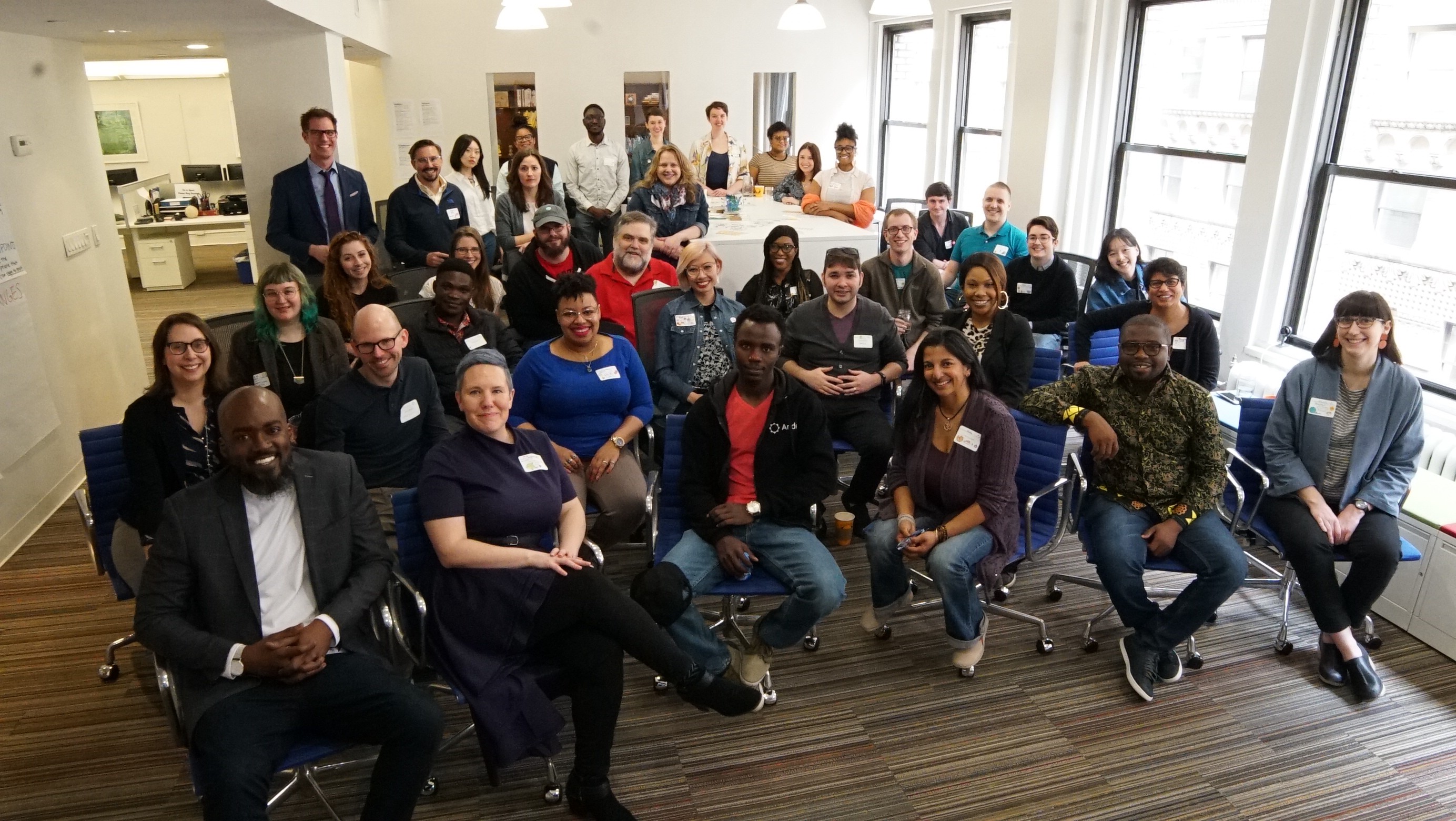How To Craft A Full Staff Event With A Focus On Shared Purpose
Tips and Tools | Event Planning | People Operations | Human Resources | Uncategorized
by Nicola Carpenter, Associate Director, People Operations at Fractured Atlas
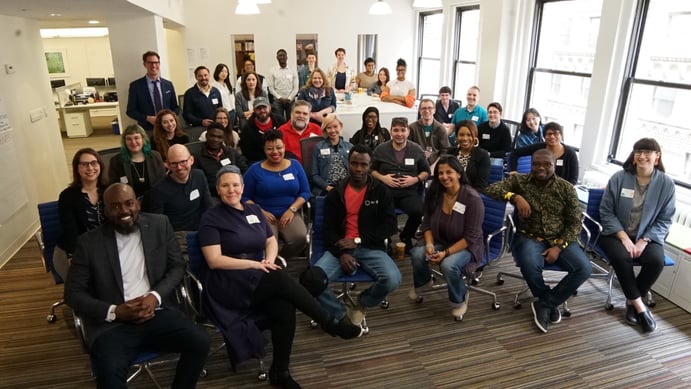 Full team photo from All Hands 2019
Full team photo from All Hands 2019
At Fractured Atlas, about half of our team work fully distributed so we started having full staff events 6 years ago when we realized that there are conversations and activities that are better to do in person. We originally called these week long events “OkTECHberfest” but changed to “All Hands” last year. Through these years, we’ve found ways of creating an event that supports our organizational shared purpose.
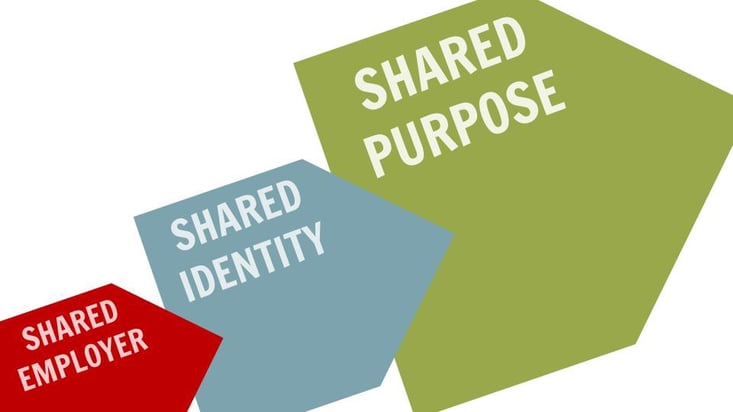 We’re striving for shared purpose
We’re striving for shared purpose
On the People Team here at Fractured Atlas we talk a lot about a culture of shared purpose. It’s the idea that organizations fall somewhere on the spectrum from shared employer (we receive a paycheck from the same place), shared identity (we share similar interests), and shared purpose (we are working towards the same externally-focused goal). We’re constantly striving to aim for shared purpose so as to better support our staff in supporting our members. Our full staff events are no different. In years past the week has been more focused on shared identity, but along the way we’ve found some things that have helped us focus on shared purpose in our events. Every organization is different, but I hope these inspire you to think about aiming for shared purpose in your next event.
Create A Purpose For Your Event
So, you have an organizational purpose. Maybe it’s something like “maximize humanity’s creative and expressive potential.” Now it’s time to decide what you want to focus the event on. You could consider this a theme, but phrasing it as an event’s purpose helps more when difficult decisions arise on what to include or what not to include. If you’re like us, you want to pack in all the things, but having a focused purpose helps make planning the event more manageable. This year at All Hands we actually had three purposes, which is likely too many, but it ended up working out. The three purposes we chose to focus on:
- Connect with Fractured Atlas Members: This focus helped us to stay focused and better understand why we do what we do at Fractured Atlas.
- Focus on what different perspectives of Anti-Racism Anti-Oppression look like in our work: For the past several years, we’ve incorporated full staff Anti-Racism Anti-Oppression trainings, and we felt it was time to explore different perspectives and what it might look like to embed this into all four days of All Hands.
- Increase our connection with each other: People were coming into New York from 10 different states and three African countries (the four developers we work with through Andela were able to join us for All Hands.)
Having these purposes helped us curate what was prioritized over the 4 days and decide what should be included in All Hands or what we should save for later.
Run the Gathering With Generous Authority
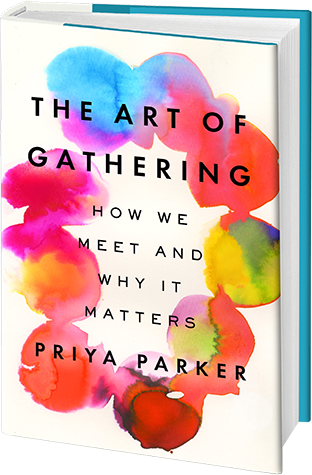 The Art of Gathering: How We Meet and Why it Matters by Priya Parker
The Art of Gathering: How We Meet and Why it Matters by Priya Parker
In the months leading up to All Hands, I learned about the book The Art of Gathering: How We Meet and Why it Matters by Priya Parker. I read the book during the All Hands planning process, and it gave me both new ideas and language for things we were already doing (like the importance in having an event purpose). One of my favorite sections in the book talks about leading events with generous authority.
Priya explains generous authority in this way:
“A gathering run on generous authority is run with a strong, confident hand, but it is run selflessly, for the sake of others. Generous authority is imposing in a way that serves your guests... It spares them from the domination of some guests by other guests that the dinner host unwittingly enabled. It wards off pretenders who threaten a purpose. Sometimes generous authority demands a willingness to be disliked in order to make your guests have the best experience of your gathering.”
The book talks about events in a broad spectrum, from company retreats to dinner parties. It’s a helpful image to think about the dinner party where one guest dominated the party in a detrimental way. Hosting an event without any sort of authority leaves an open space for anything to fill. This could mean that at the end of the event, the purpose goes unfulfilled (oh, and Priya argues that even dinner parties should have a purpose). For a dinner party this is an inconvenience, but on an organizational level it has the potential to waste what is likely your most expensive meeting or gathering of the year.
This doesn’t mean that we think that only one person, or those in formal leadership roles should have absolute control over the event. There is a flip side to the absent host that might be more prevalent in the cultural sector — the dictator host. Think about the organization where the Executive Director makes all the decisions for an annual Gala. This flip side is just as detrimental as the host that doesn’t want to uphold any form of authority. There’s a spot somewhere in the middle on the spectrum of absent host to dictator host that is the optimal place for the role of a host.
It’s also important to get people at every level of the organization participating. We’ve tried different things in the past, but this year found that having event co-chairs worked out wonderfully. Each co-chair was given info about the arch of the event, what their section contained, and the goals for the section. For example, we wanted to have a panel on the intersection of Arts and Politics. The two co-chairs for this panel were given info about the goals of the panel and what their responsibilities were. Who they chose to bring in, how the event was moderated, and coordinating day of logistics were up to them. We had other sections that also had co-chairs which allowed us to manage the overall flow of the week while also getting the range of perspectives throughout the organization.
So, get people involved with the event, but make sure that there is generous leadership to ensure that the event purpose is being fulfilled.
Prepare People for What’s to Come
People need to know what to expect, and what’s expected of them. This goes beyond just logistics (although those are important too). Priya Parker presents the idea of priming — setting the tone for what the event is going to be. A week before All Hands we like to send out an info packet. It includes:
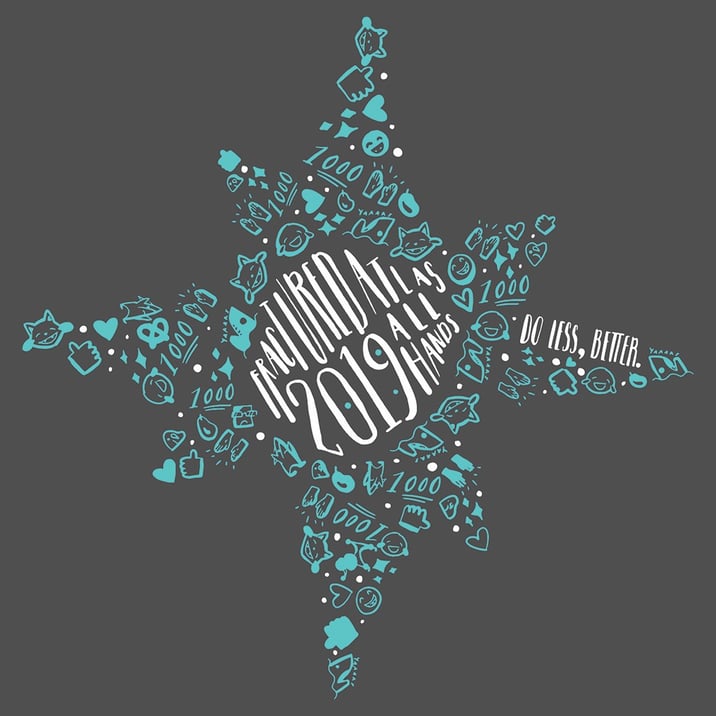 This is our 2019 t-shirt that was designed by our team member Michelle Martir, who was the t-shirt chair this year.
This is our 2019 t-shirt that was designed by our team member Michelle Martir, who was the t-shirt chair this year.
- Framing information
- The annual t-shirt design
- A full schedule
- Draft agreements (keep reading to learn more about these)
- What our welcome prompt would be to give people who don’t like spontaneous speaking time to prepare
- Any info or links related to different sessions
- Building facilities info
- Additional logistical information
- Thank yous to everyone involved.
To give you an idea of what was in the packet, here was the intro:
Hi Everyone,
We’re incredibly excited to have everyone come together for All Hands! This is the second annual All Hands, and the 6th annual full staff event (we called them OkTECHberfest previously). Every year the event is an amazing way to zoom out and think about our work a bit differently from what we do on the day to day, learn more about the members who use our products and services, and get to know each other. This year will follow these similar themes, but will of course be its own unique experience.
All Hands is both part of and separate from our day to day work. Everyone in this organization has really unique skills, viewpoints, and expertise. Throughout the 4 days we’ll be exploring bigger picture topics that require everyone’s point of view. We know that once All Hands is over we will all be going back to the day to day of our roles, but we’ll take these 4 days to think creatively about the present and future of Fractured Atlas. So come with your ideas and thoughts and be ready to have fun.
In this packet you’ll find information to root the 4 days and let you know what to expect. Take a look, and see you in 3D soon!
Best wishes,
The People Team and the Leadership Team
Sending this info in advance not only lets people know what to expect, it also cuts down the amount of time you need to focus on things like logistics at the beginning of your event.
Create Agreements Together
We regularly use agreements in our meetings and events, but thought that they were especially important for All Hands this year. As we become an increasingly distributed organization, fewer and fewer of our staff have met in person. Additionally, different teams have developed different communication norms. This is one of the reasons we think that coming together in person periodically is so important, but it also means that we need to collectively agree on how we’ll be in the space together. Before the event we drafted a number of agreements and we took some time on the morning of day one to talk through the agreements to see if any were missing or needed to be tweaked. Having time to alter the agreements at the start of the event allows everyone in the event to feel ownership of the agreements and increases buy-in. The agreements we set are:
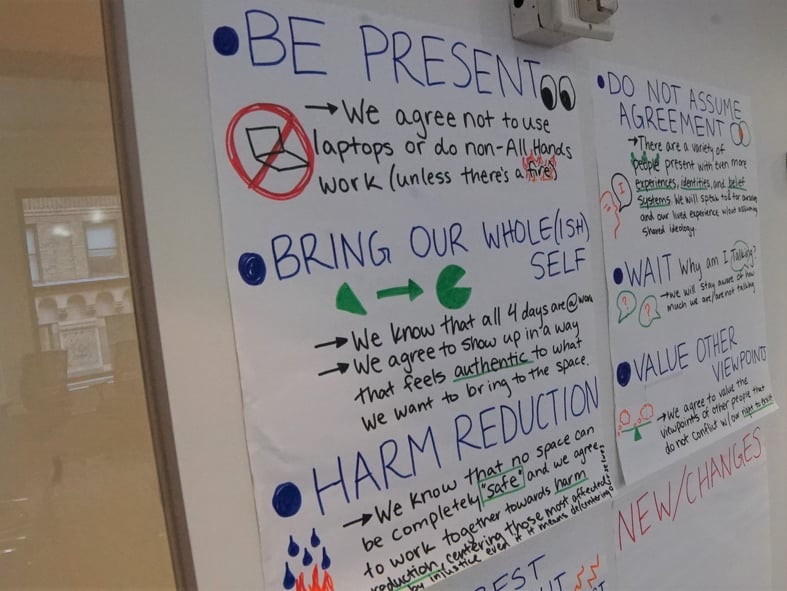 In a Lizzo-fueled haze on the Saturday set-up day before All Hands I decided that the agreements needed to be illustrated. Even though I’m not a graphic recording master, they turned out pretty fun.
In a Lizzo-fueled haze on the Saturday set-up day before All Hands I decided that the agreements needed to be illustrated. Even though I’m not a graphic recording master, they turned out pretty fun.
- Be Present: We agree not to use laptops or do non-All Hands work (unless there’s a fire). People have been notified that we’re closed these 4 days, and we want to be as present as possible.
- Bring Our Whole(ish) Self: We know that all 4 of these days are “at work,” whether we’re in the office or at dinner, so we agree to be mindful of that. But also, we agree to show up in a way that feels authentic to what we want to bring into the space.
- Harm Reduction: We know that no space can be completely “safe” and we agree to work together towards harm reduction, centering those most affected by injustice even if it means centering or decentering ourselves.
- Do not assume agreement: there are a variety of people present with even more experiences, identities, and belief systems. We will speak to and for ourselves and our lived experience without assuming shared ideology. We will ask for agreement if needed and ask clarifying questions for better understanding.
- WAIT (Why Am I Talking?”): We will stay aware of how much we are speaking. If we feel like we’re speaking a lot, we will let others speak, and if we find ourselves not talking, we will try to contribute some comments, ideas, or suggestions.
- Value Other Viewpoints: We agree to value the viewpoints of other people that do not challenge or conflict with our right to exist.
- Assume best intentions, but acknowledge impact: We’ll assume that we are all speaking with good intentions, but if someone says things that are incorrect or offensive we agree to politely call them on that.
- Don’t Drop a Bomb and Leave The Room: We agree that if we say something that causes a big reaction we will stay in the space to come to a resolution.
- Lean into Discomfort: Meetings and topics can sometimes be challenging. We know that comfort is not the same thing as safety, and we accept that discomfort is sometimes necessary.
- What’s said here stays here, what’s learned here leaves here: We know that there might be things during these 4 days that we want anonymity in outside of Fractured Atlas. While we think sharing our learning is great, get permission before sharing someone else’s story.
These agreements are borrowing from McKenzie Mack, Keryl McCord and Equity Quotient, Tiffany Wilhelm, and “Guidelines for Respectful Discussion” from GLSEN.
Leave Some Open Space
[This space intentionally left blank]
Sometimes it’s nice to have a break from content, so make sure to build breaks into your event’s schedule. These can be a mix of 15-minute breaks between sessions to grab water or snacks (time these based partially on your people-to-bathroom ratio), lunch breaks, and time for group reflection. The reflection isn’t a break in the traditional sense of the word, but it leaves room for the needs in the room.
Also be open to changing up your schedule. We were going to have a visiting professional come on Thursday but scheduling didn’t work. It ended up working perfectly though because after people heard their colleagues present lightning talks (5–7 minute presentations where people could present on anything), we had more people wanting to sign up to give their own. The hour opening ended up being a perfect place to put the extra lightning talks.
Gather Feedback For Next Time
Something we’ve been doing for a while is asking for feedback at the end of events, in the form of a survey that goes out. Usually we ask three questions via a Google Form:
- “What would you keep?”
- “What would you tweak?”
- “Is there anything else you’d like us to know?”
These seemingly simple questions give a range of information. Usually there are things that some people would keep that other people would tweak, showing that people have a range of preferences when it comes to events. There are also things that pop up frequently in one category or the other (this year people loved the lightning talks) which are a bit more helpful in planning the next event.
This year, with the three purposes I also included three questions to measure the success of the event (because of course All Hands was tied to my OKRs and I needed a measurable way to see if I achieved the Key Result or not). These three questions were:
Compared to before All Hands…
- Do you feel more connected to Fractured Atlas members?(yes/no)
- Do you have a better understanding of the range of ways Fractured Atlas can engage with Anti-Racism Anti-Oppression? (yes/no)
- Do you feel more connected to the Fractured Atlas team? (yes/no)
We’ll reference this information when planning our next full staff gathering to see how we can continue making each year better.
Use things that work, toss out things that don’t
What you see in this list are things we’ve learned over the years that work for Fractured Atlas. They might not work for you, since each organization is unique. In The Art of Gathering Priya talks about hosting events where everyone gives spontaneous toasts on a theme. To add some urgency, there’s the added rule that the last person has to sing their toast. While I think this sounds super fun at a dinner party (sorry friends), it’s not something that would go over well at Fractured Atlas. Maybe there are things on this list that sound to you like singing a toast. If that’s the case, ignore those ideas or iterate on them. I’ve gone to some not great events, and I really want your next event to be phenomenal so I hope that when you consider your next event, you’ll think through what you want it to be and how you might get there.
About Nico Carpenter
Nico Carpenter (he/they) works on the People team at Fractured Atlas, where he finds ways for tools and processes to better align with the organization’s purpose. Prior to joining Fractured Atlas, Nico worked for a variety of arts organizations including MoMA PS1, Walker Art Center, and Heidelberger Kunstverein, and they still have a particular love (and skepticism) for museums. Originally from Minneapolis, he received a BFA in Art from the University of Minnesota and continues to stay creative through knitting, sewing clothes, and finding new crafts to learn. When not working or crafting, Nico can be found reading books, teaching people mending, and finding/tending/building queer and disabled community.
